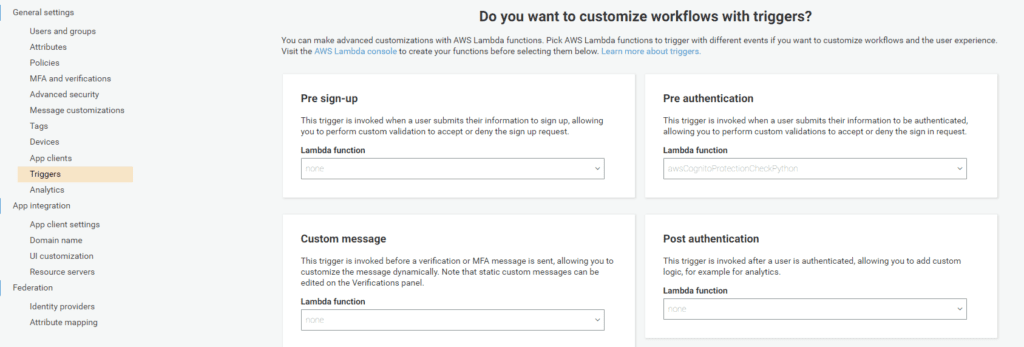
The Next Level3 AWS Cognito integration is designed to be used for your existing applications or sites that are using AWS Cognito for authentication. This integration will allow you to easily add Account Protection to any application the leverages AWS Cognito for authentication.
pre-requisites
Requirements:
– Application Authenticated via Amazon Cognito User Pools
– Next Level3 Company Account
– Signing Key created for an application in the Next Level3 Company Portal
Account Protection
ADDING ACCOUNT PROTECTION TO AMAZON COGNITO
The first step to add an NL3 Account Protection Check to an existing application that uses Amazon Cognito User Pools for authentication is to create a Lambda function that performs the lock check. Here is some sample Python code:
import json
import os
import requests
import base64
import logging
from datetime import datetime
import jwt
def getLockStatus(token, api_uri, api_path, validationData):
responseDict = {}
try:
headers_dict = {"x-nl3-authorization-token": token, "Content-Type": "application/json"}
data_dict = {
"userIP": validationData["ip"],
"userDevice": validationData["device"],
"userLocation": validationData["location"],
"integrationType": "cognito",
"integrationData": json.loads(validationData["additionalData"])
}
response = requests.post("".join([api_uri,api_path]), headers=headers_dict, json=data_dict)
responseDict = response.json()
except Exception as e:
responseDict = { "message": str(e) }
return responseDict
def lambda_handler(event, context):
if event["callerContext"]["clientId"] == os.environ["CLIENT_ID"]:
username = event["userName"]
claims = {
"iss": os.environ["APP_URI"],
"iat": (datetime.utcnow().timestamp() + (-1 * 60)),
"exp": (datetime.utcnow().timestamp() + (5 * 60)),
"aud": os.environ["API_URI"],
"sub": username
}
### Ildeally the Signing Key would be stored and retrieved from a secrets manager
### and not an environmental variable
decodedDomainToken = base64.b64decode(os.environ["SIGNING_KEY"])
token = jwt.encode(
payload=claims,
key=decodedDomainToken
)
response = getLockStatus(token, os.environ["API_URI"], os.environ["API_PATH"], event["request"]["validationData"])
if response.get("locked", False):
raise Exception(os.environ["LOCKED_MESSAGE"])
# Return to Amazon Cognito
return event
The next step is to configure the Amazon Cognito User Pool to call this Lambda function as a “Pre authentication” trigger by clicking on the User Pool and then selecting “Triggers” under “General Settings” in the side menu. Then, you will select the function you created in the drop-down box under “Pre authenticaiton” as follows:

